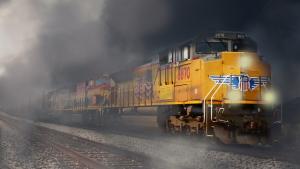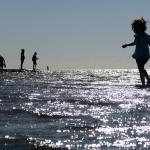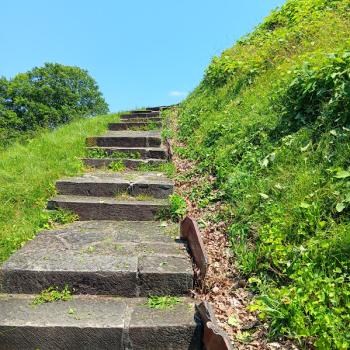
[One day in foggy, rainy winter, here in the Ohio Valley, just at the start of the liturgical season known as Ordinary Time, I was walking through my neighborhood on a poor street. I saw some houses standing and occupied, some houses abandoned, and some that had been torn down and were nothing but piles of splinters. “It looks like a bomb went off here,” I said. And I decided to bomb it, as writers do, in a story.
I originally published this story for National Science Fiction Day in 2017, but the link to the three pages of the old post has stopped working, so I’m publishing an edited and revised version as one page here.]
The Winter came after Epiphany– not the winter that comes every year, but the Winter that lasted forever. I lived in the Valley with my brothers, Cuerpo and Sukay. We’d planned to go to church the next morning, on the other side of the the mountain, and see the priest in his green vestments for Ordinary Time.
But Ordinary Time never came.
That night, we were attacked.
Half the people in the Valley died in the bombing. The ones who were outside died instantly. The ones who went to the windows to see what the bright light was, died just as fast. The ones in the houses that took direct hits, died soon after. They were lucky.
Those of us who could still walk went outside the next morning and saw the fog, and felt the warm rain. It was a drizzle, the temperature of bathwater; it smelled like burnt plastic. After a few hours, you couldn’t smell it anymore. A few hours more and the rain stopped. But the fog never really went away.
It has never gone away from the Valley.
After that, then it was Winter—the Winter that never left the Valley; a lukewarm Winter of bathwater rain every day, no stars, no blue sky, the sun a patch of yellow in the mist that was always there, the clouds that were never farther away than the tops of the houses left standing. Fog was on the ground every morning; it lifted a little after the warm rain, and then it descended when the yellow patch of sun set orange in the west.
It was a week before the National Guard arrived, all in protective suits and gas masks, just in case. They told us what we already knew—that the Valley had been bombed with a new kind of weapon, a weapon they’d never heard of before, whose long-term effects no one could guess. They told us what we didn’t know: that the rest of the world had not been attacked and life was going on normally there. They told us what we didn’t want to hear—that we were all to be quarantined in the Valley, in case of “contamination,” whatever that meant. We could only be evacuated when they were sure it was safe.
A barrier went up on our side of the river– a bright orange wall that went higher than the fog. You could just barely see it in the middle of the day, when the fog was high.
And that was how our new lives began, in the Winter, when Ordinary Time never came.
Every week, the National Guardsmen came back on a train, over the bridge through the wall’s one gate—always in their suits and gas masks, so they didn’t look human. Every week, there were bottles of filtered water and cans of food, dull metal neither marked nor labeled, rationed to each person according to our body weight and packed into a white paper bag. There was never anything solid or dry– no bread, no meat, no whole produce. There were never any seasonings, either. Only pre-cooked white rice or cornmeal mush that fell out of the can in a single solid mass, or slimy vegetables in a liquid slick. The rice and mush alternated by the week, but the vegetables had a longer cycle– creamed corn, whole corn, spinach, white beans, red beans, string beans, tomatoes. Every once in a while, fruit. Once I got peaches that were sliced instead of cubed. Once Cuerpo got mushrooms.
The bag was always printed with the same instructions: eat the starches together with the produce to make a protein, don’t share or trade rations for fear of malnourishment. But of course we did—Cuerpo, Sukay and I pooled everything into a pot and warmed it up, then scooped it back into the cans and ate it with those plastic spoons we were ordered to bring back the next week. On days we had neighbors visit, they would pool their rations with us, and we’d give the guest the biggest portion– hospitality, the kind of thing civilized folks practiced in the time before the winter. And then the guest would always refuse the biggest portion, and we’d all eat the same amount. It made us feel rich. It made us feel human.
The bag of rations was also always printed with the warning not to eat anything that grew wild on the ground. This was to avoid contamination, but it seemed pointless– no one really knew if eating what grew from the ground was more risky than walking on it, or breathing the air, or standing outside in the warm rain. No one knew if following the rule would prolong our lives, because everyone violated it: we all became foragers.
Edible plants were hard to find in the Winter, but it wasn’t impossible. Those who had been gardeners kept gardening, and at least ate the sprouts. Sometimes, with extreme care and patience, they managed to grow a crop they could share or trade. Once, early in the Winter, a rotten tomato from a garbage heap produced a few vines and gave us something to wish for– six or seven of us ate the hard green fruits, for fear that they’d rot before they ripened. Once five people picked the wrong mushrooms and were dead by morning. Once just the three of us spent the day grazing our way through a thicket that had wild pea plants. Once, just once, a man who had been a farmer presented Sukay, Cuerpo and I with a fresh sweet pepper. It had managed to get yellow on one side, and there were hardly any bug bites in the firm, clean flesh. I hadn’t even liked peppers, in the time before the winter, but I liked it then. I suppose dividing a pepper into equal thirds without a knife would seem a tedious task to people who hadn’t lived in the Valley during the Winter. But at the time we only felt reverence. We scraped the seeds off of our hands at the end and gave them back to the farmer, in case he’d be in the valley long enough to plant a second crop.
We didn’t just forage for food; we also needed fuel– wood, brush, anything to keep the fires going at night. There was profit to be made in dismantling what was left of the ruined houses, after the National Guard had gone through them. Bodies, cash, books and anything else of particular value were removed and carted away quickly, but there was smashed furniture and wood paneling to harvest. It was difficult at first. I hadn’t built a thing in the days before the winter, but Sukay had built all kinds of things. He knew how to take them back apart. He knew how to find the joints where the wood was weakest, and pry them into kindling.
At night we’d lie together by the fire close under one blanket, for warmth. I slept in the middle, with Cuerpo nearest the wall and Sukay near the door. We listened to the fire crackle. We told stories of the way it was in the time before the Winter, though as time went by we forgot. We did anything we could to keep our minds off the silence—no crickets, no cars, nobody walking around outside, not a breath of wind. The silence was the most terrible thing.
Every thirty days, the National Guard would bring doctors to examine us. I never had the same doctor twice in a row, but they all followed the same procedure– listen to the heart, glance at the throat and eyes, take one vial of blood and a single hair. Then there was the contraceptive shot. No word on how great the risk or what contamination would do to a baby; they never gave us a choice in the matter, either. Men were presumed diseased and required to take sanitary precautions when they took pleasure. Women were barren and required to remain so every month.
The doctors never told us what they were looking for in those exams. But every month, with our first bag of rations, we received their report. It was one sentence, written on thin paper and stapled to the outsides of the paper bags. Sometimes, rarely, the sentence would read “So-and-So is required to leave the Valley on the next available transport–” and that person would be gone within a week, in one of the passenger cars on the National Guard’s train. Sometimes those people would write back to us– or, at least, we sometimes heard that they had. No one ever wrote to Sukay, Cuerpo or I. But everyone knew someone who’d received a letter, or knew someone who knew someone who had. Outside the Valley, the letters said, people were very sorry for us. There were prayer vigils held on our behalf all the time. There were efforts being made to hasten the evacuation, to clean up contamination and get us to safety. There was help being organized, as well– seeds and plants were going to be sent, measures going to be taken to clear the air and clean the water. Soon and very soon.
Of course, these things never came. I never could tell if the others around me believed in them or only said that they did, but the only help that came was water, rations and the monthly doctors’ visits. Sukay was adamant that the only way to improve our situation was to get out of the Valley. Cuerpo held the opposite opinion. Cuerpo believed there was nothing outside the Valley– nothing different, at any rate. He was certain the contamination must cover the whole world. The National Guard was fooling us, writing letters, spreading stories about the world as it had been before the Winter when no such place existed anymore. Otherwise, no one would obey them. He believed the people ordered to leave on the next available transport were being taken away for mercy killing. I wondered which was really mercy– to be here, in the Valley, with my rations and some semblance of hope, or to die on the train.
Most often, the sentence on the bag would read “So-and-so is required to stay in the Valley pending a doctor’s examination.” This person would stay in the valley for at least another month, then sit through another meeting with the doctor, another sampling, another shot. And so we waited, wondering how much chance we had of really getting out, how sure we were to die.
And, of course, many people did die in the Winter.
It wasn’t something we liked to talk about. Even when a person broke out in the first signs of contamination sickness, none of us would mention it. They usually had a few good weeks left, after all. The rash moved very slowly. At first, it didn’t even hurt. And every month the National Guardsmen who passed out the rations reminded us that a cure for contamination was on its way, just as the letters informed us that cleanup was coming. Maybe next month. Maybe next week. Soon and very soon.
Often, contaminated people would go off and kill themselves before the last stage of the sickness started, and then they’d die alone. But if they chose to wait it out, we’d all gather to be with them. We kept vigil as they suffered, right until the end—helpless, but present, bearing witness. It made us feel human.
That went on for years—cans, bottles, foraging, looking for wood, huddling around fires; the tepid fog, the warm rain, the silent nights. Less and less growing in the ground, less and less fuel for fires, fewer and fewer of our neighbors alive, no children, no stars, no sunshine, not a breath of wind. Blood tests. Shots. Sleeping together for warmth. Bearing witness for the dying.
It got so I couldn’t imagine anything else.
Then, one day, the three of us found new doctors’ reports stapled to our bags of rations.
Cuerpo was required to stay in the Valley, pending a doctor’s examination.
Sukay was required to leave the Valley on the next available transport.
And my report said something I’d never seen before.
My report said that I was allowed to choose.
I could choose whether to stay in the Valley or not.
I could stay with Cuerpo, someone I loved, in the Valley that was all I knew, and forage, and search for firewood, and bear witness to death. Or I could get on the train with Sukay, whom I loved, and go somewhere else, somewhere I didn’t know, to live a way of life I’d forgotten. Maybe all my hope would be in vain. Maybe there’d be nothing but death once we left the Valley, and maybe that would be mercy. The next available transport left the next day. That was all the time I had to choose—everything I knew, or something that might be mercy.
Familiarity, or the possibility of mercy.
Winter, or Ordinary Time.
Cuerpo said he’d take me to see the train, before I made up my mind.
We climbed the hill and the old stairs, halfway down the cliff face before the flood plain of the river we couldn’t see. Just above the train tracks, we found a tree to sit under—a living tree. It hadn’t quite been stripped by the foragers, yet. There were reddish buds on the upper branches.
Cuerpo reached for my hand.
I saw that he had the first markings of contamination sickness—the white rash forming on his wrists. I assumed he was going to ask me to stay with him, to bear witness when the time came, but he didn’t say anything. We waited in silence, under the branches, under the fog, holding hands in the warm rain.
Just as the train entered the Valley, I felt something I had forgotten—wind. Wind was blowing on me from somewhere across the river, through the gate. It smelled like something else I’d forgotten. It smelled clean. And then, just for a second, a miracle.
The fog lifted.
It might have been just my imagination, except that this was more vivid than anything I’d ever imagined. This was more brilliant than any of the faded memories of life before the Winter. I could see beyond the top of the orange fence. Sukay was right and Cuerpo was wrong. The fog did not cover the whole earth. I saw green—bright leaves of healthy plants, on the top of the cliffs at the other side of the river. I saw grass. I saw trees that no foragers had stripped. Above them, I saw a few pure white clouds in a vibrant blue sky.
I wondered why anyone had ever said that blue and green did not match– that they didn’t look beautiful side by side. Blue and green were perfect together. Blue and green were the most wondrous colors God had ever created, the most wondrous things that could ever be. Blue was the color of a sky unmarred by contaminated fog. Green was the color of spring and summer and life, of everything that came after the Winter. Green was the color of Ordinary Time, and there could never be anything in this world more beautiful than Ordinary Time.
Then the fog was back again.
Cuerpo wasn’t holding my hand– he was nowhere to be found.
I didn’t realize what he’d done for me, until after the train thundered past.
He had made up my mind.
There was no reason to stay.
Sukay and I left the Valley the next day.
And I send back this letter, for anyone who cares to read it. Help is coming, to take you to safety, as quick as it can. The Valley is all shadow and death, but the Valley is not all there is left. The Winter does not cover the whole earth. You will see the sun again. There is such a thing as blue and green, as spring and summer, fasts and feasts and Ordinary Time.
Soon and very soon, you will see Spring.
Mary Pezzulo is the author of Meditations on the Way of the Cross, The Sorrows and Joys of Mary, and Stumbling into Grace: How We Meet God in Tiny Works of Mercy.













